Tag Archives: Gulf shrimp
Shrimp labeling bill could be a lifesaver for Gulf industry
 If you are what you eat, you might want to put down that shrimp po’boy. That’s unless, of course, you know you’re eating Gulf shrimp. State Rep. Terri Leo Wilson partnered with six other Gulf Coast representatives on House Bill 2343, which would keep restaurants from selling imported farm-raised shrimp and implying it was caught by Texas shrimpers. The timing is crucial. The Texas shrimp industry is struggling under pressure of inferior, cheap foreign shrimp flooding the market, she said. Leo Wilson and others testifying in support of the bill Wednesday said Texas should follow the lead of Louisiana, Alabama and other Gulf Coast states that have put shrimp labeling requirements into law. Such laws have bolstered their respective shrimp industries, they said. more, >>CLICK TO READ<< 10:30
If you are what you eat, you might want to put down that shrimp po’boy. That’s unless, of course, you know you’re eating Gulf shrimp. State Rep. Terri Leo Wilson partnered with six other Gulf Coast representatives on House Bill 2343, which would keep restaurants from selling imported farm-raised shrimp and implying it was caught by Texas shrimpers. The timing is crucial. The Texas shrimp industry is struggling under pressure of inferior, cheap foreign shrimp flooding the market, she said. Leo Wilson and others testifying in support of the bill Wednesday said Texas should follow the lead of Louisiana, Alabama and other Gulf Coast states that have put shrimp labeling requirements into law. Such laws have bolstered their respective shrimp industries, they said. more, >>CLICK TO READ<< 10:30
US taxpayer funds went to foreign competition for domestic shrimpers
 Fishermen and shrimpers in the United States have been in a decades-long battle with the very institutions meant to protect them, specifically the U.S. Treasury Department and its World Bank delegation. U.S. trade law bars the support of competing industries in which there is excess supply. Despite such laws, U.S. taxpayers spent two decades funding “aquaculture” projects in Vietnam, India, Ecuador and Indonesia, countries that now supply the overwhelming majority of shrimp to U.S. consumers. “There’s a law on the books that requires the United States, their directors that are at these international financial institutions, to use their voice and vote to oppose any project that where there’s a commodity that’s produced in surplus and where export to the United States would seriously injure a domestic industry,” Nathan Rickard, a trade lawyer who represents the Southern Shrimp Alliance,,, more, >>CLICK TO READ<< 12:45
Fishermen and shrimpers in the United States have been in a decades-long battle with the very institutions meant to protect them, specifically the U.S. Treasury Department and its World Bank delegation. U.S. trade law bars the support of competing industries in which there is excess supply. Despite such laws, U.S. taxpayers spent two decades funding “aquaculture” projects in Vietnam, India, Ecuador and Indonesia, countries that now supply the overwhelming majority of shrimp to U.S. consumers. “There’s a law on the books that requires the United States, their directors that are at these international financial institutions, to use their voice and vote to oppose any project that where there’s a commodity that’s produced in surplus and where export to the United States would seriously injure a domestic industry,” Nathan Rickard, a trade lawyer who represents the Southern Shrimp Alliance,,, more, >>CLICK TO READ<< 12:45
Shrimp tested at NOLA restaurants: “The most blatant examples of inauthenticity”
 The shrimp testers are back in Louisiana, testing the authenticity of seafood at New Orleans restaurants ahead of the Super Bowl. New Orleans restaurants claiming to sell ‘Gulf’ shrimp were tested for authenticity, with about 1 out of 8 restaurants passing off imported shrimp as locally caught. SeaD Consulting tested shrimp at 24 restaurants and found that 3 of them were serving imported shrimp. Dave Williams, Founder of SeaD Consulting, said this is a very high level of authenticity compared to other places. “The restaurants that were inauthentic were inauthentic in a very egregious manner,” Dave said. “They were using lots and lots of imagery, wording and bold statements that they’re serving Gulf shrimp, and they weren’t. The offenders were really, really bad.” Video, more, >>CLICK TO READ<< 07:58
The shrimp testers are back in Louisiana, testing the authenticity of seafood at New Orleans restaurants ahead of the Super Bowl. New Orleans restaurants claiming to sell ‘Gulf’ shrimp were tested for authenticity, with about 1 out of 8 restaurants passing off imported shrimp as locally caught. SeaD Consulting tested shrimp at 24 restaurants and found that 3 of them were serving imported shrimp. Dave Williams, Founder of SeaD Consulting, said this is a very high level of authenticity compared to other places. “The restaurants that were inauthentic were inauthentic in a very egregious manner,” Dave said. “They were using lots and lots of imagery, wording and bold statements that they’re serving Gulf shrimp, and they weren’t. The offenders were really, really bad.” Video, more, >>CLICK TO READ<< 07:58
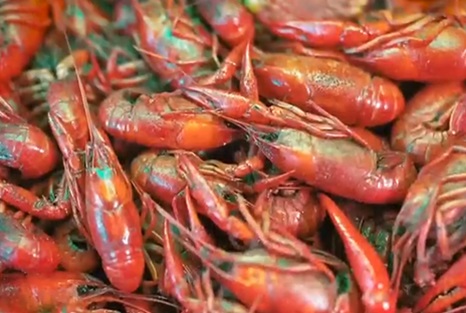
New law aims to support La. seafood industry
A new law is now in affect across the state requiring restaurants to provide transparency on where they are sourcing their seafood. Louisiana Law Act 148 became effective on Jan. 1 and requires restaurants that serve seafood to have the origins of their seafood listed on their menus. “We actually love the new law because we have been serving Louisiana crawfish and gulf shrimp our entire operation,” said Paige Vidrine at Steamboat Bill’s. “My mom started selling shrimp on the side of the road from shrimpers that were coming in from Hackberry and she bought her first dock there. That’s how Steamboat Bill’s came to be – from shrimping. So, it’s something integral in our culture and it’s something we will always love to support our local American farmer.” more, >>CLICK TO READ<< 08:533
Is Your ‘Gulf’ Shrimp Actually Farm-Raised Overseas?
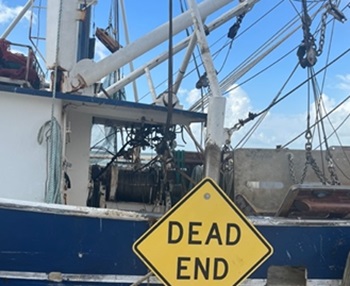 Think you love Gulf shrimp? It’s possible you’ve never even tasted it. Last Labor Day weekend, sample genetic testing at the Louisiana Shrimp & Petroleum Festival in Morgan City, Louisiana — where you’d naturally think “Gulf” shrimp was being sold and promoted in a town built on shrimping — revealed that only one of five vendors (Woodreaux’s Cajun Cuisine) was actually serving the real deal. Unaware festival goers never thought to question the source as they consumed imported, farm-raised shrimp right next to the Gulf of Mexico. Shrimp switching is likely happening at your favorite seafood eatery or grocery store, too, despite labeling and signage that may mislead you, just as it did those festival goers. Doug Olander, a commercial shrimp fisherman from Port St. Mary, Louisiana, whose boats have mostly remained docked for two years, says the supply chain needs the transparency that widespread testing provides. “This type of fraud should be a crime,” Olander says. more, >>CLICK TO READ<< 08:38
Think you love Gulf shrimp? It’s possible you’ve never even tasted it. Last Labor Day weekend, sample genetic testing at the Louisiana Shrimp & Petroleum Festival in Morgan City, Louisiana — where you’d naturally think “Gulf” shrimp was being sold and promoted in a town built on shrimping — revealed that only one of five vendors (Woodreaux’s Cajun Cuisine) was actually serving the real deal. Unaware festival goers never thought to question the source as they consumed imported, farm-raised shrimp right next to the Gulf of Mexico. Shrimp switching is likely happening at your favorite seafood eatery or grocery store, too, despite labeling and signage that may mislead you, just as it did those festival goers. Doug Olander, a commercial shrimp fisherman from Port St. Mary, Louisiana, whose boats have mostly remained docked for two years, says the supply chain needs the transparency that widespread testing provides. “This type of fraud should be a crime,” Olander says. more, >>CLICK TO READ<< 08:38
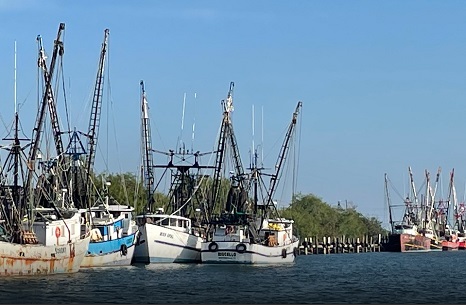
Texas: New shrimp season tangled up in regulations
That plate of fried shrimp people enjoy at a restaurant –whether locally or away from home – could either be taken off the menus or cost a lot more. The tastier Gulf shrimp caught by trawlers off the Texas Gulf Coast from the Brownsville/Port Isabel to the Palacios areas could also be replaced by farmed-raised crustaceans. That’s because this South Texas industry – one of the nation’s largest – is caught in the middle of a crisis caused by today’s U.S. immigration policies and by what is going on in countries south of Mexico. The expected arrival of hundreds of people who traditionally work on the boats, known as shrimp headers, is on halt right now; yet the kickoff of the 2022 season is about two weeks away. >click to read< 17:53
Texas House passes H.B.1260, The “Gulf Shrimp Liberty Act”
 The Texas House passed House Bill 1260 by State Representative Dade Phelan, which creates a new occupational license for non-Texas commercial shrimpers for the unloading of shrimp. Currently, Texas has a moratorium on commercial Gulf shrimper licenses, meaning no new licenses are being issues and haven’t been issued in several years. The shrimpers being referred to in HB 1260 are the more than 500 out-of-state Gulf shrimpers who are currently not allowed to come into Texas waters without a license. “HB 1260 opens up the Texas seafood market to 7 million pounds of Gulf shrimp and over $100 million in economic activity for the state of Texas”, Representative Phelan stated. “The ability for non-Texas shrimpers to unload in Texas also means that they will refuel, gather supplies, and perform maintenance on their boats, providing more jobs and generating sales tax revenue that will positively impact the coast.” click here to read the story 11:56
The Texas House passed House Bill 1260 by State Representative Dade Phelan, which creates a new occupational license for non-Texas commercial shrimpers for the unloading of shrimp. Currently, Texas has a moratorium on commercial Gulf shrimper licenses, meaning no new licenses are being issues and haven’t been issued in several years. The shrimpers being referred to in HB 1260 are the more than 500 out-of-state Gulf shrimpers who are currently not allowed to come into Texas waters without a license. “HB 1260 opens up the Texas seafood market to 7 million pounds of Gulf shrimp and over $100 million in economic activity for the state of Texas”, Representative Phelan stated. “The ability for non-Texas shrimpers to unload in Texas also means that they will refuel, gather supplies, and perform maintenance on their boats, providing more jobs and generating sales tax revenue that will positively impact the coast.” click here to read the story 11:56
Are these Gulf shrimp? Audubon program aims to hook you on local seafood
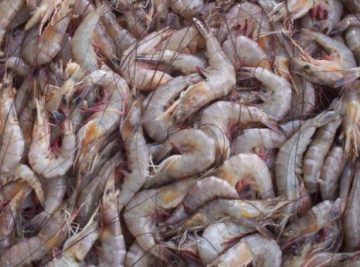 “National Seafood Month is very much about educating people about Gulf of Mexico seafood and why it’s important to support Gulf of Mexico seafood,” said John Fallon, assistant director of the GULF program. In New Orleans, the month will be marked with a six-course Tuna Fête on Oct. 25 at Carrollton Market restaurant. The dinner will star Gulf of Mexico yellowfin tuna. Dinner with wine pairings is $150 per person, $100 without wine. Tax and gratuity included. It’s a good time for locals to get in the habit of finding out where the seafood they are eating comes from, he said, noting, “90 percent of seafood consumed in the United States is imported” from other countries. Video, Read the rest here 10:38
“National Seafood Month is very much about educating people about Gulf of Mexico seafood and why it’s important to support Gulf of Mexico seafood,” said John Fallon, assistant director of the GULF program. In New Orleans, the month will be marked with a six-course Tuna Fête on Oct. 25 at Carrollton Market restaurant. The dinner will star Gulf of Mexico yellowfin tuna. Dinner with wine pairings is $150 per person, $100 without wine. Tax and gratuity included. It’s a good time for locals to get in the habit of finding out where the seafood they are eating comes from, he said, noting, “90 percent of seafood consumed in the United States is imported” from other countries. Video, Read the rest here 10:38
Shrimp business bounces back for some, not others
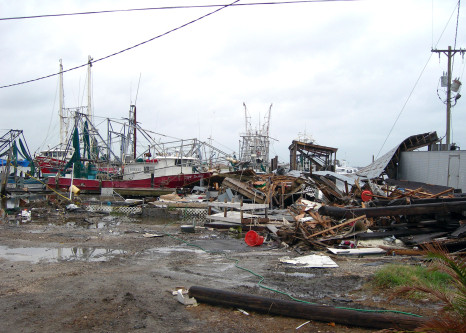 Ten years after Hurricane Katrina left him with nothing but his three medium-sized refrigerator vessels, shrimper Steve Bosarge has overcome major tribulation to expand his business. Years before the catastrophe, Bosarge diversified his business because of increased shrimping competition. In the 1990s, he began providing endangered species animal relocation and site clearance services for oil companies. He had no way of knowing that this side work would save his business. He continues that service today, along with his original career. Many captains of smaller boats were not as fortunate. Read the rest here 18:50
Ten years after Hurricane Katrina left him with nothing but his three medium-sized refrigerator vessels, shrimper Steve Bosarge has overcome major tribulation to expand his business. Years before the catastrophe, Bosarge diversified his business because of increased shrimping competition. In the 1990s, he began providing endangered species animal relocation and site clearance services for oil companies. He had no way of knowing that this side work would save his business. He continues that service today, along with his original career. Many captains of smaller boats were not as fortunate. Read the rest here 18:50
Shortage of imported shrimp – Gulf shrimp, crab scarcity nets high prices
One reason for rising shrimp prices on the coast is a shortage of imported shrimp. A new strain of a common bacterium has been wiping out populations since 2009 in southeast Asia, where most of the world’s shrimp is raised on farms. It started in China then spread to Vietnam and now Thailand, the world’s largest shrimp exporter. Quantities of shrimp from Thailand have dropped 37 percent from last year, according to the U.S. Department of Commerce. Called Early Mortality Syndrome, the disease can take out an entire pond in a few days, but is not harmful to humans. more@commercialappeal 05:07
Seafood packers struggle with shrimp shortage – Gulf shrimp proving to be hard to come by this year
BEAUMONT, Texas (AP) — Seafood Lover owner Steve Edwards is determined not to raise his shrimp prices — at least for now — despite a lag in supply this season. Edwards has been primarily buying shrimp from three boats in the area for the past 30 years. He knows the shrimpers’ costs are up and their catches down, he said. continued












































